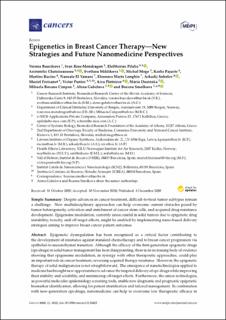| dc.contributor.author | Buociková, Verona | |
| dc.contributor.author | Rios-Mondragon, Ivan | |
| dc.contributor.author | Pilalis, Eleftherios | |
| dc.contributor.author | Chatziioannou, Aristotelis | |
| dc.contributor.author | Miklíková, Svetlana | |
| dc.contributor.author | Mego, Michal | |
| dc.contributor.author | Pajuste, Karlis | |
| dc.contributor.author | Rucins, Martins | |
| dc.contributor.author | El Yamani, Naouale | |
| dc.contributor.author | Longhin, Eleonora Marte | |
| dc.contributor.author | Sobolev, Arkadij | |
| dc.contributor.author | Freixanet, Muriel | |
| dc.contributor.author | Puntes, Victor | |
| dc.contributor.author | Plotniece, Aiva | |
| dc.contributor.author | Dusinska, Maria | |
| dc.contributor.author | Cimpan, Mihaela Roxana | |
| dc.contributor.author | Gábelová, Alena | |
| dc.contributor.author | Smolková, Božena | |
| dc.date.accessioned | 2021-05-04T13:10:05Z | |
| dc.date.available | 2021-05-04T13:10:05Z | |
| dc.date.created | 2020-12-03T22:24:43Z | |
| dc.date.issued | 2020-12-03 | |
| dc.identifier.issn | 2072-6694 | |
| dc.identifier.uri | https://hdl.handle.net/11250/2753532 | |
| dc.description.abstract | Epigenetic dysregulation has been recognized as a critical factor contributing to the development of resistance against standard chemotherapy and to breast cancer progression via epithelial-to-mesenchymal transition. Although the efficacy of the first-generation epigenetic drugs (epi-drugs) in solid tumor management has been disappointing, there is an increasing body of evidence showing that epigenome modulation, in synergy with other therapeutic approaches, could play an important role in cancer treatment, reversing acquired therapy resistance. However, the epigenetic therapy of solid malignancies is not straightforward. The emergence of nanotechnologies applied to medicine has brought new opportunities to advance the targeted delivery of epi-drugs while improving their stability and solubility, and minimizing off-target effects. Furthermore, the omics technologies, as powerful molecular epidemiology screening tools, enable new diagnostic and prognostic epigenetic biomarker identification, allowing for patient stratification and tailored management. In combination with new-generation epi-drugs, nanomedicine can help to overcome low therapeutic efficacy in treatment-resistant tumors. This review provides an overview of ongoing clinical trials focusing on combination therapies employing epi-drugs for breast cancer treatment and summarizes the latest nano-based targeted delivery approaches for epi-drugs. Moreover, it highlights the current limitations and obstacles associated with applying these experimental strategies in the clinics. | en_US |
| dc.language.iso | eng | en_US |
| dc.publisher | MDPI | en_US |
| dc.rights | Navngivelse 4.0 Internasjonal | * |
| dc.rights.uri | http://creativecommons.org/licenses/by/4.0/deed.no | * |
| dc.title | Epigenetics in Breast Cancer Therapy—New Strategies and Future Nanomedicine Perspectives | en_US |
| dc.type | Journal article | en_US |
| dc.type | Peer reviewed | en_US |
| dc.description.version | publishedVersion | en_US |
| dc.rights.holder | Copyright 2020 by the authors. | en_US |
| cristin.ispublished | true | |
| cristin.fulltext | original | |
| cristin.qualitycode | 1 | |
| dc.identifier.doi | 10.3390/cancers12123622 | |
| dc.identifier.cristin | 1856054 | |
| dc.source.journal | Cancers | en_US |
| dc.source.40 | 12 | |
| dc.source.14 | 12 | |
| dc.source.pagenumber | 3622 | en_US |
| dc.relation.project | EC/H2020/857381 | en_US |
| dc.relation.project | EC/H2020/862296 | en_US |
| dc.identifier.citation | Cancers. 2020, 12 (12), 3622. | en_US |
| dc.source.volume | 12 | en_US |
| dc.source.issue | 12 | en_US |

